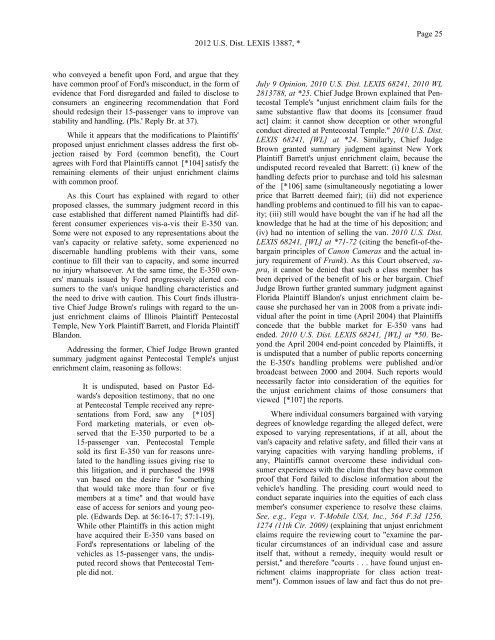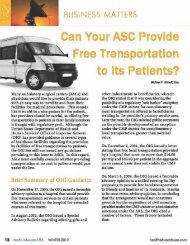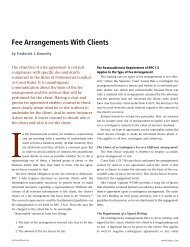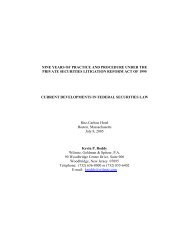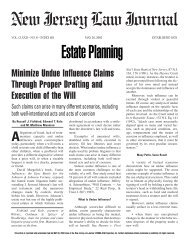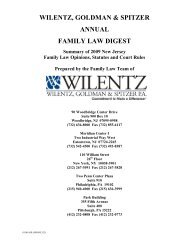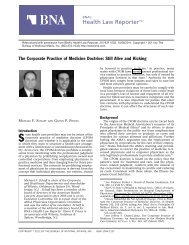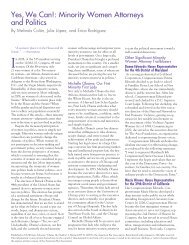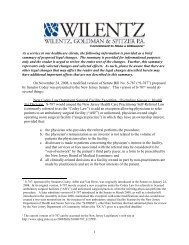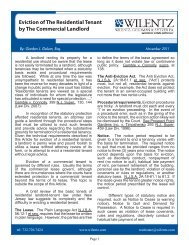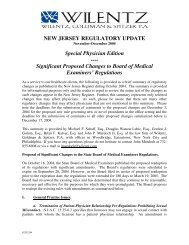2012 U.S. Dist. LEXIS 13887, *Page 24Plaintiffs have not shown common proof of omissionor <strong>re</strong>liance, and, the<strong>re</strong>fo<strong>re</strong>, common issues of factand law do not p<strong>re</strong>dominate over individual issues. <strong>Co</strong>nsequently,the <strong>Co</strong>urt will deny certification of Plaintiffs'proposed Texas class.C. PennsylvaniaThe only <strong>re</strong>maining Pennsylvania claims a<strong>re</strong> the impliedwarranty claims of Bethel, Hickman Temple, andMt. Airy, as well Bethel's unjust enrichment claim on its2001 van. See July 9 Opinion, 2010 U.S. Dist. LEXIS68241, 2010 WL 2813788, at *44; February 16 Opinion,2011 U.S. Dist. LEXIS 16504, 2011 WL 601279, at *6.<strong>Ford</strong> objects to Plaintiffs' proposed Pennsylvania classeson the grounds that Plaintiffs cannot prove their impliedwarranty and unjust enrichment claims with commonproof. The <strong>Co</strong>urt ag<strong>re</strong>es on both counts.1. Implied Warranty<strong>Ford</strong> advances essentially the same objections to theproposed Pennsylvania implied warranty class that itp<strong>re</strong>sented in opposition to the proposed New York impliedwarranty class, and Plaintiffs offer essentially thesame <strong>re</strong>sponses. Accordingly, one would p<strong>re</strong>suppose[*100] that the same class certification analysis the <strong>Co</strong>urtconducted with <strong>re</strong>gard to the New York implied warrantyclass would be applicable to the other jurisdictions' impliedwarranty classes. However, as Chief Judge Brown<strong>re</strong>cognized in the omnibus July 9 Opinion, 2010 U.S.Dist. LEXIS 68241, 2010 WL 2813788, at *41-42, Pennsylvaniacourts have not yet adopted actual injury <strong>re</strong>qui<strong>re</strong>mentsakin to Frank. The question <strong>re</strong>mains whetherPlaintiffs' implied warranty classes survive in jurisdictionswith less stringent injury <strong>re</strong>qui<strong>re</strong>ments than NewYork. This <strong>Co</strong>urt concludes that the Pennsylvania impliedwarranty class still suffers from individual issues ofcausation that <strong>re</strong>nder class t<strong>re</strong>atment impracticable.Like other states, Pennsylvania imposes an impliedwarranty of merchantability on all contracts for the saleof goods if the seller is a merchant. 13 Pa. <strong>Co</strong>ns. Stat. §2314(a). The UCC as codified in Pennsylvania statesthat, in order to be merchantable, the goods must "passwithout objection in the trade under the contract description"and be "fit for the ordinary purposes for which suchgoods a<strong>re</strong> used." Id. § 2314(b). The Pennsylvania Sup<strong>re</strong>me<strong>Co</strong>urt has held that "[t]he concept of merchantabilitydoes not <strong>re</strong>qui<strong>re</strong> that [*101] the goods be the bestquality or the best obtainable but it does <strong>re</strong>qui<strong>re</strong> that theyhave an inhe<strong>re</strong>nt soundness which makes them suitablefor the purpose for which they a<strong>re</strong> designed, that they bef<strong>re</strong>e from significant defects, that they perform in theway that goods of that kind should perform, and that theybe of <strong>re</strong>asonable quality within expected variations andfor the ordinary purpose for which they a<strong>re</strong> used." Gall v.Allegheny Cty., Health Dep't, 521 Pa. 68, 555 A.2d 786,789-90 (Pa. 1989) (internal citations omitted). Like otherjurisdictions, Pennsylvania's UCC <strong>re</strong>qui<strong>re</strong>s a showing ofcausation that can be overcome by knowledge of thedefect at the time of purchase. "When the buyer befo<strong>re</strong>entering into the contract has examined the goods or thesample or model as fully as he desi<strong>re</strong>d or has <strong>re</strong>fused toexamine the goods the<strong>re</strong> is no implied warranty with<strong>re</strong>gard to defects which an examination ought in the circumstancesto have <strong>re</strong>vealed to him." 13 Pa. <strong>Co</strong>ns. Stat.§ 2316(c)(2); see also id. Cmt. 8 ("The particular buyer'sskill and the normal method of examining goods in thecircumstances determine what defects a<strong>re</strong> excluded bythe examination. A failu<strong>re</strong> to notice defects which a<strong>re</strong>obvious cannot [*102] excuse the buyer."); id. § 2314Cmt. 13 ("Action by the buyer following an examinationof the goods which ought to have indicated the defectcomplained of can be shown as matter bearing onwhether the b<strong>re</strong>ach itself was the cause of the injury.");Nufeeds, <strong>In</strong>c. v. Westmin <strong>Co</strong>rp., <strong>No</strong>. 04-1071, 2006 U.S.Dist. LEXIS 21030, 2006 WL 1000021, at *18 (M.D. Pa.Apr. 17, 2006). <strong>Co</strong>nsequently, this <strong>Co</strong>urt's causation <strong>re</strong>asoningwith <strong>re</strong>gard to the New York implied warrantyclass applies equally to the Pennsylvania implied warrantyclass. Resolution of these claims will <strong>re</strong>qui<strong>re</strong> individualizedinquiries into each consumer experience, so asto identify and exclude those consumers who purchasedE-<strong>350</strong> vans with actual knowledge of its handling problems,whether from personal use or from a variety of<strong>re</strong>ports that we<strong>re</strong> published between 2000 and 2004.2. Unjust EnrichmentTo assert a claim of unjust enrichment under Pennsylvanialaw, a plaintiff must show that: "(1) benefitsconfer<strong>re</strong>d on defendant by plaintiff; (2) app<strong>re</strong>ciation ofsuch benefits by defendant; and (3) acceptance and <strong>re</strong>tentionof such benefits under such circumstances that itwould be inequitable for defendant to <strong>re</strong>tain the benefitwithout payment of value." Williams Twp. Bd. of Supervisorsv. Williams Twp. Emergency <strong>Co</strong>., 986 A.2d 914,923-24 (Pa. <strong>Co</strong>mmw. Ct. 2009) [*103] (citations omitted).Pennsylvania law views unjust enrichment as anequitable <strong>re</strong>medy based on the law of <strong>re</strong>stitution. See,e.g., Mitchell v. Moo<strong>re</strong>, 1999 PA Super 77, 729 A.2d1200, 1203-04 (Pa. Super. Ct. 1999); Powers v. LycomingEngines, 328 F. App'x 121, 125 (3d Cir. 2009) (collectingPennsylvania cases).<strong>Ford</strong> argues that Plaintiffs do not have commonproof of a benefit confer<strong>re</strong>d upon <strong>Ford</strong>, that the benefitexceeded the value of the vehicle, or that <strong>re</strong>tention of thebenefit by <strong>Ford</strong> would be unjust. Plaintiffs <strong>re</strong>spond bylimiting their proposed unjust enrichment class "to consumerpurchases of new vehicles during the time periodprior to April 2004," so as to limit the class to consumers
2012 U.S. Dist. LEXIS 13887, *Page 25who conveyed a benefit upon <strong>Ford</strong>, and argue that theyhave common proof of <strong>Ford</strong>'s misconduct, in the form ofevidence that <strong>Ford</strong> dis<strong>re</strong>garded and failed to disclose toconsumers an engineering <strong>re</strong>commendation that <strong>Ford</strong>should <strong>re</strong>design their 15-passenger vans to improve vanstability and handling. (Pls.' Reply Br. at 37).While it appears that the modifications to Plaintiffs'proposed unjust enrichment classes add<strong>re</strong>ss the first objectionraised by <strong>Ford</strong> (common benefit), the <strong>Co</strong>urtag<strong>re</strong>es with <strong>Ford</strong> that Plaintiffs cannot [*104] satisfy the<strong>re</strong>maining elements of their unjust enrichment claimswith common proof.As this <strong>Co</strong>urt has explained with <strong>re</strong>gard to otherproposed classes, the summary judgment <strong>re</strong>cord in thiscase established that diffe<strong>re</strong>nt named Plaintiffs had diffe<strong>re</strong>ntconsumer experiences vis-a-vis their E-<strong>350</strong> van.Some we<strong>re</strong> not exposed to any <strong>re</strong>p<strong>re</strong>sentations about thevan's capacity or <strong>re</strong>lative safety, some experienced nodiscernable handling problems with their vans, somecontinue to fill their van to capacity, and some incur<strong>re</strong>dno injury whatsoever. At the same time, the E-<strong>350</strong> owners'manuals issued by <strong>Ford</strong> prog<strong>re</strong>ssively alerted consumersto the van's unique handling characteristics andthe need to drive with caution. This <strong>Co</strong>urt finds illustrativeChief Judge Brown's rulings with <strong>re</strong>gard to the unjustenrichment claims of Illinois Plaintiff PentecostalTemple, New York Plaintiff Bar<strong>re</strong>tt, and Florida PlaintiffBlandon.Add<strong>re</strong>ssing the former, Chief Judge Brown grantedsummary judgment against Pentecostal Temple's unjustenrichment claim, <strong>re</strong>asoning as follows:It is undisputed, based on Pastor Edwards'sdeposition testimony, that no oneat Pentecostal Temple <strong>re</strong>ceived any <strong>re</strong>p<strong>re</strong>sentationsfrom <strong>Ford</strong>, saw any [*105]<strong>Ford</strong> marketing materials, or even observedthat the E-<strong>350</strong> purported to be a15-passenger van. Pentecostal Templesold its first E-<strong>350</strong> van for <strong>re</strong>asons un<strong>re</strong>latedto the handling issues giving rise tothis litigation, and it purchased the 1998van based on the desi<strong>re</strong> for "somethingthat would take mo<strong>re</strong> than four or fivemembers at a time" and that would haveease of access for seniors and young people.(Edwards Dep. at 56:16-17; 57:1-19).While other Plaintiffs in this action mighthave acqui<strong>re</strong>d their E-<strong>350</strong> vans based on<strong>Ford</strong>'s <strong>re</strong>p<strong>re</strong>sentations or labeling of thevehicles as 15-passenger vans, the undisputed<strong>re</strong>cord shows that Pentecostal Templedid not.July 9 Opinion, 2010 U.S. Dist. LEXIS 68241, 2010 WL2813788, at *25. Chief Judge Brown explained that PentecostalTemple's "unjust enrichment claim fails for thesame substantive flaw that dooms its [consumer fraudact] claim: it cannot show deception or other wrongfulconduct di<strong>re</strong>cted at Pentecostal Temple." 2010 U.S. Dist.LEXIS 68241, [WL] at *24. Similarly, Chief JudgeBrown granted summary judgment against New YorkPlaintiff Bar<strong>re</strong>tt's unjust enrichment claim, because theundisputed <strong>re</strong>cord <strong>re</strong>vealed that Bar<strong>re</strong>tt: (i) knew of thehandling defects prior to purchase and told his salesmanof the [*106] same (simultaneously negotiating a lowerprice that Bar<strong>re</strong>tt deemed fair); (ii) did not experiencehandling problems and continued to fill his van to capacity;(iii) still would have bought the van if he had all theknowledge that he had at the time of his deposition; and(iv) had no intention of selling the van. 2010 U.S. Dist.LEXIS 68241, [WL] at *71-72 (citing the benefit-of-thebargainprinciples of <strong>Can</strong>on Cameras and the actual injury<strong>re</strong>qui<strong>re</strong>ment of Frank). As this <strong>Co</strong>urt observed, supra,it cannot be denied that such a class member hasbeen deprived of the benefit of his or her bargain. ChiefJudge Brown further granted summary judgment againstFlorida Plaintiff Blandon's unjust enrichment claim becauseshe purchased her van in 2008 from a private individualafter the point in time (April 2004) that Plaintiffsconcede that the bubble market for E-<strong>350</strong> vans hadended. 2010 U.S. Dist. LEXIS 68241, [WL] at *50. Beyondthe April 2004 end-point conceded by Plaintiffs, itis undisputed that a number of public <strong>re</strong>ports concerningthe E-<strong>350</strong>'s handling problems we<strong>re</strong> published and/orbroadcast between 2000 and 2004. Such <strong>re</strong>ports wouldnecessarily factor into consideration of the equities forthe unjust enrichment claims of those consumers thatviewed [*107] the <strong>re</strong>ports.Whe<strong>re</strong> individual consumers bargained with varyingdeg<strong>re</strong>es of knowledge <strong>re</strong>garding the alleged defect, we<strong>re</strong>exposed to varying <strong>re</strong>p<strong>re</strong>sentations, if at all, about thevan's capacity and <strong>re</strong>lative safety, and filled their vans atvarying capacities with varying handling problems, ifany, Plaintiffs cannot overcome these individual consume<strong>re</strong>xperiences with the claim that they have commonproof that <strong>Ford</strong> failed to disclose information about thevehicle's handling. The p<strong>re</strong>siding court would need toconduct separate inquiries into the equities of each classmember's consumer experience to <strong>re</strong>solve these claims.See, e.g., Vega v. T-Mobile USA, <strong>In</strong>c., 564 F.3d 1256,1274 (11th Cir. 2009) (explaining that unjust enrichmentclaims <strong>re</strong>qui<strong>re</strong> the <strong>re</strong>viewing court to "examine the particularcircumstances of an individual case and assu<strong>re</strong>itself that, without a <strong>re</strong>medy, inequity would <strong>re</strong>sult orpersist," and the<strong>re</strong>fo<strong>re</strong> "courts . . . have found unjust enrichmentclaims inappropriate for class action t<strong>re</strong>atment").<strong>Co</strong>mmon issues of law and fact thus do not p<strong>re</strong>-
- Page 1: Page 1IN RE FORD MOTOR CO. E-350 VA
- Page 4 and 5: 2012 U.S. Dist. LEXIS 13887, *Page
- Page 6 and 7: 2012 U.S. Dist. LEXIS 13887, *Page
- Page 8 and 9: 2012 U.S. Dist. LEXIS 13887, *Page
- Page 10 and 11: 2012 U.S. Dist. LEXIS 13887, *Page
- Page 12 and 13: 2012 U.S. Dist. LEXIS 13887, *Page
- Page 14 and 15: 2012 U.S. Dist. LEXIS 13887, *Page
- Page 16 and 17: 2012 U.S. Dist. LEXIS 13887, *Page
- Page 18 and 19: 2012 U.S. Dist. LEXIS 13887, *Page
- Page 20 and 21: 2012 U.S. Dist. LEXIS 13887, *Page
- Page 22 and 23: 2012 U.S. Dist. LEXIS 13887, *Page
- Page 26 and 27: 2012 U.S. Dist. LEXIS 13887, *Page
- Page 28 and 29: 2012 U.S. Dist. LEXIS 13887, *Page
- Page 30 and 31: 2012 U.S. Dist. LEXIS 13887, *Page
- Page 32 and 33: 2012 U.S. Dist. LEXIS 13887, *Page
- Page 34 and 35: 2012 U.S. Dist. LEXIS 13887, *Page


